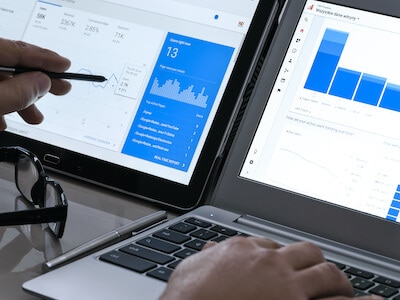When creating a website for your business, you’ll hear a lot about website traffic (the number of visitors to your website) and how important it is to the success of your business. But do you know how to find out your website traffic? And when you do find out, do you know what to do to improve it?
We understand that developing a website is an overwhelming task. Once you’re done with it, it’s just easier to let go and pretend it’s going to get you leads through some kind of Internet Magic™. Unfortunately, that’s just not the case!
There are so many variables involved in the performance of a website, and the worst thing you can do is leave it all to chance.
That’s why it’s important to routinely check on your website performance and do everything you can to optimise it for success! Keep scrolling for the answer to how do you find out your website traffic number and what to do to improve it when you do.
Why you should find out your website traffic
There are many reasons you should get website traffic information for your website. But here are a few important ones!
1. It gives you data to inform your strategy
When you check your website traffic and keep a close eye on site statistics, you’re learning how and why people discover your website. It also show how long people stay and which pages are the most important. And this is the first step in making sure even more traffic arrives at your website! Developing that instinct will help you create web traffic strategies that actually work.
2. It allows you to track the ROI of your marketing efforts
Whether you’re creating a lot of content, promoting your website on social media, or investing in digital advertising, it’s important to track your marketing efforts to see if they’re actually working.
Your return on investment (ROI) will allow you to make decisions about your marketing and put your budget and efforts in the right areas. Checking your website traffic gives you a detailed view about which parts of your digital marketing strategy are working (and which ones aren’t!).
3. You’ll see what type of content drives traffic
The content on your website is key to its success, so having a clear understanding of what type of content brings the traffic will help guide your content marketing strategy.
When you know what content resonates with your target audience, you can make more of it. Remember to also break this down by the different channels and which demographics are visiting your website.
4. You can optimise your website for lead conversion
All this talk about building a beautiful website doesn’t matter if you’re not optimising your website for lead conversion! In a nutshell, lead conversion refers to turning visitors into customers (or newsletter subscribers, if that’s your goal).
Your website traffic to lead conversion rate is a useful metric to track when it comes to website traffic and how well your website is converting leads.
How to find out your website traffic
Fortunately, there’s a variety of online tools and websites for tracking website traffic! Checking your website traffic has never been so easy.
However, it’s important to note that each website traffic online tool or website will have its own strengths and weaknesses, so it’s important to do your own research before committing to any paid plans.
We also encourage you to use at least two different methods to track your traffic, because it’s the best way to get the most accurate view of your website traffic performance.
Google Analytics
With just a few clicks, Google Analytics can help you view the traffic sources of all of your website’s pages, including landing pages. It’s also one of the few tools out there that allows you to view all your traffic sources, including social media and email marketing.
You can also use Google Analytics to track a whole range of other metrics that are important for your website’s performance!
The free version of this tool is useful enough for small businesses and solo entrepreneurs! We highly recommend that you use Google Analytics as part of your website traffic tracking efforts.
Alternatives to Google Analytics include Amplitude, Mixpanel and Woopra. Every analytics tool has pros and cons. Also with these less known tools, there tends to be less resources. So you need to make the decision right for you, your budget and business.
Google Search Console
Yep, another tool by Google to help you check your website traffic! Using Google Search Console is a quick and easy way to track all your website traffic that comes from Google searches.
By using the Performance Report, you can group and filter your website traffic data by the various dimensions, including keywords, landing pages, user location, user devices, and even how your website was displayed in the search results.
When using Google Analytics, the search console (formerly known as Google Webmasters) will provide you with many of the keywords considered as ‘not defined’ in your reports.
SEMRush
Often cited as one of the best keyword research tools on the web, SEMRush also makes it easy to get a detailed analysis of your website traffic. You can view anything – from which external websites are bringing the most traffic to your website and the pages on your website that get the most traffic, to the volume of traffic that you get each month and the keywords that get you the most traffic.
One of the best things about SEMRush is that it not only allows you to analyse your website metrics; you can even view your competitors’ website traffic! All you need to do is input a competitor’s URL into the search bar.
You can even bulk search for multiple competitors. This is an excellent way to benchmark your website performance. Just keep in mind that if your competitor receives less than 10,000 monthly visits to their site, then this information may not be accurate or readily available based on how the tool works.
Ubersuggest
This is one of the most beginner-friendly website traffic and keyword research tools out there, and even it’s free version is impressive. In fact, the free version of Ubersuggest gives you access to 3 whole months of data. To start using it, all you have to do is enter your website URL and click ‘Search’.
Ubersuggest has a traffic analyser feature that will give you a detailed look at your website traffic, the keywords that bring you the most traffic, as well as the most popular pages on your website. Meanwhile, the traffic overview will show you the total number of organic keywords that your website ranks for in search results, as well as the organic monthly traffic.
Ahrefs
Much like SEMRush, this tool allows you to easily check your website traffic data based on organic search results. However, you do have to pay to use Ahrefs – in fact, even the 7-day trial isn’t free.
However, a paid account allows you to filter your website traffic report to view the traffic stats for the year, last 30 days, or all time. This is in addition to heaps of other data that will help you analyse other useful website metrics as well.
What to do to improve your website traffic
There’s a vast variety of different techniques and strategies to improve your website traffic. Some might require more effort than others, while others might be too technical to attempt doing it alone. However, we’ll be sharing some of the quickest and easiest ways to increase website traffic right here!
1. Search Engine Optimisation (SEO)
Simply put, SEO is a combination of different things you can do on and off your website to direct traffic your way. All these activities are meant to help your website rank higher on search engine results pages (SERPs), which plays a huge role in making your website more discoverable when people search for keywords related to your business.
SEO is a non-negotiable if you want your website to have any hope of success. In fact, If you do nothing else to improve your website traffic, you must commit to SEO! We’re so passionate about SEO that we’ll explain more about the importance of SEO in further detail in the next section.
2. Use social media to drive traffic to your website
We’ll say it now: it’s really difficult in today’s digital climate to boost website traffic without social media. The fact is, your audience (AKA target market) are on different social media platforms at any given time. If you’re not discoverable to them on there, you’d be hard pressed to direct traffic to your website.
As a matter of fact, as of 2021, there are 4.14 billion active social media users worldwide – and this number is growing at an average rate of 2 million each day. Research has also shown that we spend roughly 15% of our waking lives on social media.
Now, please remember that this should not be the only web traffic source in your strategy. Getting website traffic from Instagram, Facebook or Linkedin is not the main function of those platforms – they are primarily a marketing tool for brand recognition and community engagement. But they can and do drive traffic to your website and shouldn’t be ignored.
3. Digital marketing funnels
Marketing funnels are an age-old concept that explains the journey that a customer will take from discovering your business to making a purchase (or other kind of conversion). In the digital realm, this data is more trackable than ever, which makes your digital marketing funnels a useful way to guide your strategies to improve your website traffic.
While the traditional marketing funnel has been co-opted into the digital marketing world, we argue that the more customer-centric love marketing funnel more readily resonates with today’s audiences. By taking this approach, you’re putting your customers at the heart of what you do, and that makes an impression!
4. Digital advertising
Aside from organic digital marketing, you also have the opportunity to invest in paid digital marketing to increase your website traffic – for instance, Google ads. When you search for something on Google, you’ll see websites appearing at the very top of the search results with the word “Ad” just before the URL.
This is actually a brilliant form of paid advertising that puts websites at the top of search engine result pages for targeted keywords or ones they’d be unlikely to rank for. Aside from doing everything you can to place your website in the first page of organic search results, paid Google ads can also be something to consider to drive traffic to your website.

5. User experience (UX) and Core Web Vitals
Another way to increase website visits is to create a website that users genuinely enjoy using. This is called ‘user experience’ or UX. One reason you should be doing this is to ensure your customer experience is solid even in the digital realm, because it does say a lot about your credibility and brand experience overall.
Another reason your website should prioritise UX is because Google takes it into consideration when ranking your website on its’ search engine results! A few different metrics, which Google have named Core Web Vitals, are deemed important by Google. Improving on these metrics will be key to getting your website ranked higher long-term and having more traffic arrive at your website’s doorstep.
6. Get the right web hosting
When you use an unreliable or untrustworthy website hosting provider, it really knocks down your credibility points. For one, it may signal to Google that your website isn’t secure. Secondly, if your website is known for being too slow or having too much downtime, customers are more likely to go to a competitor’s more reliable website to make their purchase.
Finding the right web hosting provider will require a fair bit of research, but it’s a worthwhile endeavor if you want to maximise website traffic. At LYF Solutions®, we offer a range of green web hosting packages that will help your business grow while doing good for the planet!
The importance of SEO to improve your website traffic
What is SEO Marketing?
Search engine optimisation is the most important method for driving traffic to your website. By optimising your website and making it SEO-friendly, you’re encouraging Google to list your website high up on search engine results.
Why is this important? Well, research has shown that the first five organic results on Google account for 67.60% of all the clicks. If you’re not on that first page, you’re simply a lot less likely to get the website traffic you’re hoping for.
How SEO Works
Google uses over 200 different SEO ranking factors when determining search rankings. But SEO specialists and researchers have identified a few key SEO ranking factors that help Google recognise websites as valuable, useful, and worthy of high ranking. This is how SEO can improve your website traffic!
How to develop SEO
As mentioned above, there are a lot of factors that search engines take into account when it comes to ranking your website. While you can certainly DIY it, we highly recommend SEO outsourcing so you’re getting the best advice and strategies specific to your website and your business.
We can help you use SEO to drive traffic to your website!
At LYF Solutions®, we focus on best practice ethical SEO marketing that focuses on organic growth for small businesses. Our focus is on getting your website fully optimised for SEO first, and then moving on to off-page strategies to maximise traffic to your amazing website.
At the end of the day, what’s important to us is helping you understand how SEO helps your business and providing you with the strategies that will actually work now (and in the long term) for your business growth and success.
You can learn more about our SEO marketing services on our SEO Marketing Explained page!


















